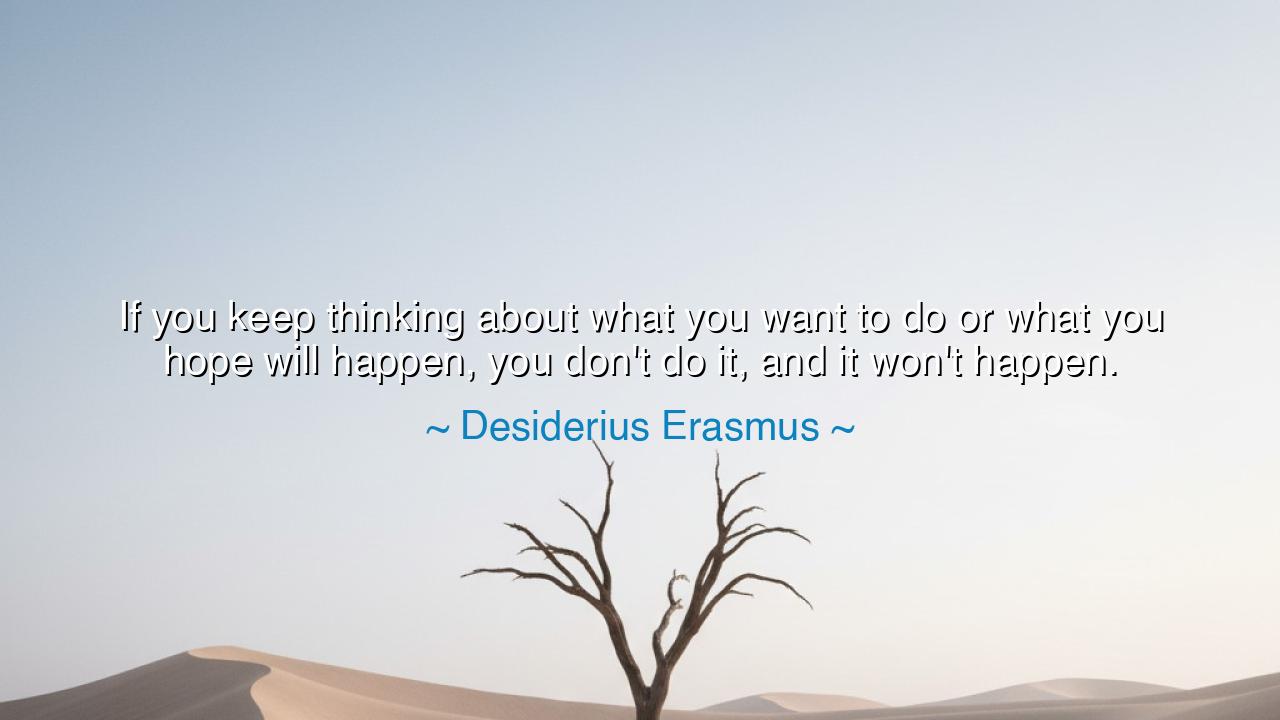
If you keep thinking about what you want to do or what you hope
If you keep thinking about what you want to do or what you hope will happen, you don't do it, and it won't happen.






"If you keep thinking about what you want to do or what you hope will happen, you don't do it, and it won't happen." – Desiderius Erasmus
These words from Desiderius Erasmus, the great humanist of the Renaissance, echo across centuries like the tolling of a bell reminding the dreamer to awaken. In this saying, Erasmus lays bare one of the oldest truths of human nature — that thought without action is the sleep of the soul. To dream endlessly is to wither silently; to act, however humbly, is to breathe life into the dream. Hope is the seed, but action is the sunlight that makes it grow. Without that light, even the noblest vision remains a shadow of what might have been.
The origin of this wisdom comes from Erasmus’s lifelong battle against complacency and fear. Living in an age when Europe was gripped by ignorance, superstition, and division, he sought to revive the human spirit through education and reason. He saw too many men who wished for change but dared not move — scholars lost in speculation, rulers bound by hesitation, and souls content with wishing rather than doing. Thus, his warning was both gentle and severe: Do not remain imprisoned by your own thoughts. The world is not changed by contemplation alone, but by the courage to transform thought into deed.
History bears witness to this truth. When Leonardo da Vinci sketched his flying machines, many laughed. He could have remained in his notebooks, thinking endlessly about the miracle of flight. Yet others, centuries later — inspired by his daring visions — turned his thoughts into wings of steel. The Wright brothers, with trembling hands and tireless hearts, acted. They did not wait for perfect certainty; they took imperfect action. In that moment, humanity rose from earth to sky. Erasmus’s words ring through their story: dreams manifest not through thought alone, but through the sacred union of vision and labor.
There is a kind of comfort in endless thinking. It feels safe to imagine what could be, without facing the risk of failure. But that comfort is a silent poison. Fear disguises itself as reflection, whispering, “Wait a little longer. Think a little more.” Yet life is fleeting, and the days slip through our fingers like sand. Those who wait for perfect conditions die waiting. The ancients taught that fortune favors not the cautious, but the bold — those who act even when afraid, who build even when uncertain, who plant even when the sky is dark.
Erasmus does not condemn thought — he exalts it when it serves as the forerunner of action. To act without reflection is folly, but to reflect without ever acting is cowardice. The wise man thinks in order to move; the fool thinks in order to avoid moving. Wisdom is the bridge between vision and reality, and only by crossing that bridge does one touch destiny. For every dream withheld from action is a song left unsung, a light never kindled, a life half-lived.
So, my children, when the time comes to choose — between dreaming and doing, between waiting and beginning — remember the words of Erasmus. Let your thoughts be wings, not anchors. Fear will always be near, whispering that you are not ready. But readiness is not found before action; it is forged through action. Each step, no matter how small, brings clarity, courage, and the momentum of creation.
Lesson: To think is divine, but to act is the proof of divinity within us. Do not let your hopes rot in the garden of delay. Write the book, build the craft, speak the truth, plant the seed. Every moment of hesitation steals from the life that could have been. Begin — and in beginning, you shall find both strength and grace. For in the end, it is not the dreamers who shape the world, but those who dare to do.






AAdministratorAdministrator
Welcome, honored guests. Please leave a comment, we will respond soon